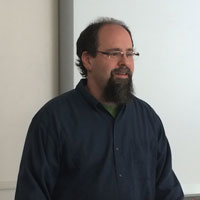
Teaching About the Politics of Religion and Social Change
Every time I walk into a classroom or workshop for the first time, I hear the voices of elders in the long, Black-led struggle for justice pressing the questions: “How are you going to bring people into the movement? How are you going to plant the seeds and bring forth a revolution of values?” My thoughts are always about what it means to model the just peace of the society that is and has yet to be. The orientation I bring to the classroom or workshop space is one of religion and nonviolent social change focused in civic engagement and social action.
The tasks and challenges we face today in the religious studies and peace studies classrooms are not unlike those faced over the past several decades. Rev. Dr. Martin Luther King, Jr. gave his “Breaking the Silence: Beyond Vietnam” sermon 50 years ago. In the sermon King called us to a “revolution of values.”[1] The revolution of values is a move away from a thing-oriented society toward a human-oriented society. It helps to create a society where everyone has their needs met and no one is oppressed. King was speaking out against the value the United States placed on the evils of racism, materialism, and militarism. According to elder Grace Lee Boggs, a revolution of values and building up the Beloved Community, are "about redefining our relationships with one another, to the Earth and to the world; about creating a new society in the places and spaces left vacant by the disintegration of the old; about hope, not despair; about saying yes to life and no to war; about finding the courage to love and care for the peoples of the world as we love and care for our own families.”[2]
The recent wave of political and social violence against Black and Brown people, women, queer, non-gender conforming people, and religious minorities is not new. It is just more overt. The risks of talking about religion, politics, and the politics of religion in the classroom are high. We see friends and colleagues being labeled “dangerous.” Yet, our tasks as teachers are to critique and improve society. We do the emotional and complicated work of instilling in our students' religious literacy, a political consciousness, and a sense of calling. A large part of moving students to political consciousness and calling is the idea that human beings are all connected to one another, to the past, to the ancestors, and to the future. In other words, becoming politically conscious is to move toward the understanding that who I am is related to who you are.
Simultaneously, the move toward calling presses the idea that what I do is related to social responsibility. Ultimately, what I believe about and how I live has consequences for others. In my courses, religious literacy becomes a tool for moving students into a new political consciousness. Students learn about the beliefs and practices of a variety of religious traditions and the political implications of those traditions. Along the way, students are given the opportunity to reflect on their own beliefs and practices.
The pedagogical tools I have found useful in the endeavor to create a revolution of values and a new political consciousness are:
- Be authentic and present. I try to think of my teaching in terms of a pedagogy of relationship and community. I spend time during the first weeks of a semester allowing students to get to know one another. I treat classroom spaces as community spaces. As the professor, this means being vulnerable and transparent. Students know when a teacher is not being real. I cannot ask students to share their personal stories and experiences without being willing to do so as is appropriate.
- Make it real. I ask students to reflect on why religious literacy and political consciousness are helpful in their work, their relationships, their vocation, and in their civic engagement. If students can make the material relevant to themselves they are more likely to take it with seriousness. Making it real means exposing students to practitioners and the stories of real people. Teachers having their limits and being transparent about those limits allows students to see do likewise.
- Be clear about the end goal. If the point is to move students toward a revolution of values, then we must develop a pedagogy of transformation and hope. Too often religious and political discourse is about what we are against. In the words of elder Vincent Harding, “No matter what form education may take . . . I am convinced that one of its most important responsibilities is to nurture the realization that we can change our lives for the better, that another creative, more democratic way of life is possible, that the seeds of such a new way are already alive within us, needing to be nurtured.”[3]
In these times the stakes are very high. How are we bringing people into the movement? How are we planning the seeds for a revolution of values? What are working toward?
[1] King, Jr., Martin Luther, “Beyond Vietnam,” Available online at https://kinginstitute.stanford.edu/king-papers/documents/beyond-vietnam. Accessed March 8, 2016.
[2] Boggs, Grace Lee. “The Beloved Community of Martin Luther King.” May 20, 2004. Yes. http://www.yesmagazine.org/issues/a-conspiracy-of-hope/the-beloved-community-of-martin-luther-king. Accessed August 14, 2014.
[3] Harding, Vincent, and Daisaku Ikeda. America Will Be!: Conversations on Hope, Freedom, and Democracy. 2013, 174.
Leave a Reply